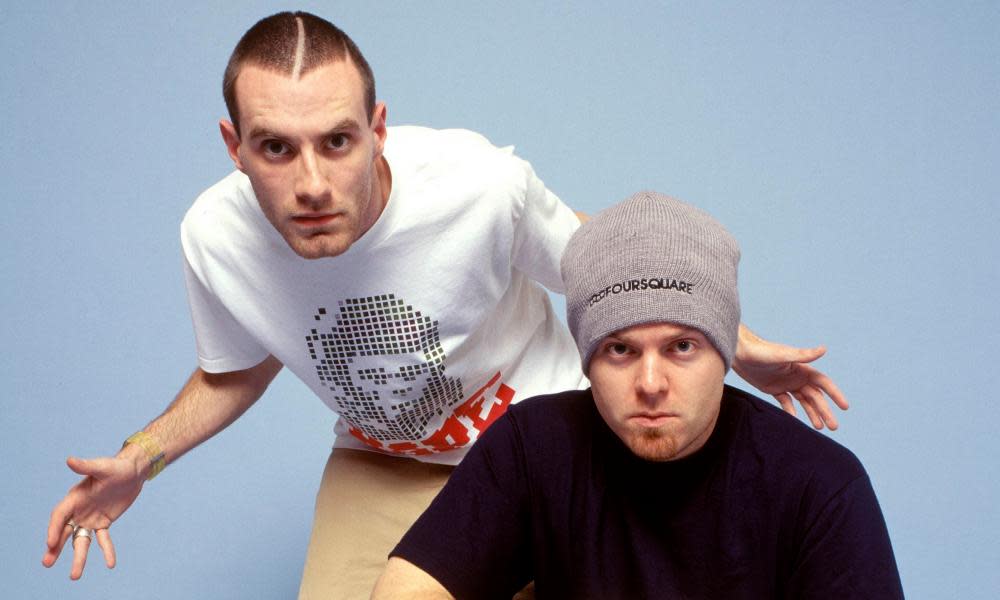‘I accidentally invented trip-hop’ – how we made DJ Shadow’s Endtroducing

Josh Davis, aka DJ Shadow
By 1991, sampling had entered a golden era with De La Soul’s 3 Feet High and Rising, NWA’s Straight Outta Compton and the Beastie Boys’ Paul’s Boutique. I was a senior in high school, frustrated that I couldn’t afford turntables, let alone a sampler. I was doing poor man’s sampling by cueing records directly into my four-track cassette recorder, trying to fool the industry that I was more equipped.
I pooled all my money, went down to the Guitar Center in San Francisco and bought the Akai MPC60. When anybody buys an instrument, they always say that they go home and stay awake for two and a half days, just playing. That’s exactly what I did. You could only sample 2.5 seconds of stereo and store 13 seconds, so I would do the beat, melody, percussion, and go to the studio of Dan the Automator, a producer who had an early form of multi-tracking using VHS tapes. For the seven-inch mix of Stem, I wanted to sample Heat, the 1995 movie, so I said: “Make sure you’ve got a VCR. I’m gonna go rent the movie.”
I wanted people to understand that sampling has a long lineage, so the credits are right there in the liner notes. James Lavelle from Mo’Wax said: “Give us a list of the big eight.” So I identified the samples most likely to cause issues, such as Metallica, Björk and the piano on Midnight in a Perfect World that comes from 1969 song The Human Abstract by David Axelrod. A few weeks later I said, “Do you want some more?” and he said, “We still have our hands full, thanks.”
Just push your sound, I said, don’t worry about choruses and verses
I spent the summer of 1996 in the UK promoting the album. As a 23-year-old, there seemed such an optimistic aura. The album didn’t take off in the US until a year later. I’d hop on the phone to do an interview and would be met with a confused silence: people assumed I was British.
I know some fans think I don’t like talking about Endtroducing, as if it’s some sort of albatross, but that’s not true. There’s also been a narrative that James and I don’t get along. There has been some truth to that, but I’d do anything for James, and I’m sure he feels the same.
James Lavelle, Mo’Wax label founder
I was 17 and working at Honest Jon’s on Portobello Road, London. It specialised in collectible black soul, funk, R&B, jazz and reggae. On my suggestion it started stocking the records from the scene I was DJing – acid jazz, US hip-hop, Massive Attack and new London soul – and it became a bit of a hub.
I was DJing in New York and LA and would go around US record companies picking up unreleased vinyl hip-hop promos. Doin’ Damage in My Native Language, by African Zimbabwe hip-hop act Zimbabwe Legit, wasn’t very good. But on the B-side there was this new mix by this DJ I hadn’t heard of before – DJ Shadow – called Shadow’s Legitimate Mix, full of scratching and samples. It was beautiful and unusual, even though it had little to do with the original, and I started playing it in my DJ sets. I accidentally invented trip-hop: mixing unusual hip-hop instrumentals with other electronic records to create a soundscape.
I got a friend from Tommy Boy Records to introduce me to Shadow. We spoke for hours on the phone about British hip-hop and the NME. I was 19 and had grown up in Oxford; he was 21 and had grown up in Davis, California. We both felt like we’d come from suburbia, outside the main cities. I said: “Would you be interested in making a record for Mo’Wax, my label? Don’t worry about choruses and verses, just push your sound further into that world.”
The album took a year and a half to make. We hung out in San Francisco and London. The samples were pretty easy to clear. It’s different when you’re sampling some Swedish drum break from 1970 than sampling James Brown or the Rolling Stones. People said: “Nobody’s gonna listen to instrumental hip-hop.” But I was thinking of huge soundscapes, like the ones by Pink Floyd or Beethoven.
Cool Britannia was mainly guitar bands, but by 1996, Portishead, Massive Attack, the Chemical Brothers and Underworld had moved to the mainstream. Entroducing hit a moment and was NME’s No 5 album of the year. It still has a timeless quality and an innocence by being crafted without relying on technology. It was trying to change the world, but in a very understated and subtle way.
• The 25th anniversary remaster of Endtroducing is out now.

 Yahoo Movies
Yahoo Movies 
